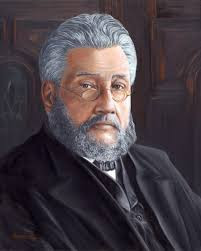For the twenty five years I served as a minster at Pole Creek Baptist Church, I was subject to an annual review by the Personnel Committee—as were all our staff. It was not a bad time, but productive as a time of self-reflection and objective evaluation. I first had to fill out a form sharing progress toward the previous year’s goals and setting forth what I believed God was directing me to do in the year to come.
But, the truth is, people are always scrutinizing us and judging us. It is not an annual matter, but a daily one. Each week they judge our sermons as to content and delivery. They look at our work and judge us as successful or failing. They not only look at what we do but the way we do it—evaluating actions and attitudes.
The reality is that you cannot please everyone. Not even a champion like Paul was immune from criticism. People have their favorite preachers, and it can become political, as Paul confronted in the Corinthian church in the prior chapter.
So, what about the preacher’s performance?
Consider OUR REQUIREMENT, “This is how one should regard us, as servants of Christ and stewards of the mysteries of God. Moreover, it is required of stewards that they be found faithful.” (v. 1-2).
We are required to be servants of the Savior—“servants of Christ.” Church folk will have an expectation that we serve them. Yet, our duty is to serve our Master—and that will, of course, lead us to serve the members. The key, however, is that we are not seeking to be people-pleasers, but rather to please our Lord. This gets to our motivation. We are not hirelings, who labor for earthly payment, but we are shepherds who toil for eternal reward.
We are also required to be stewards of the Scripture—“stewards of the mysteries of God.” Good shepherds are faithful to feed the flock of God. The sheep need the Word of God. Our call is to stay true to the sound doctrine delivered to us and to fearlessly proclaim it. We hope the congregation will receive it, but the reality is that the Lord will review it.
What does God require of the preacher? Paul says it is, “that they be found faithful.” We cannot always assure fruitfulness, but we can pursue faithfulness.
Thus, we should expect OUR REVIEW, “But with me it is a very small thing that I should be judged by you or by any human court. In fact, I do not even judge myself. For I am not aware of anything against myself, but I am not thereby acquitted. It is the Lord who judges me. Therefore do not pronounce judgment before the time, before the Lord comes, who will bring to light the things now hidden in darkness and will disclose the purposes of the heart.” (v. 3-5a).
There will be human judgment. “But with me it is a very small thing that I should be judged by you or by any human court,” (v. 3a). You do not have to ask—judgment will be shared. Sometimes it will be to your face, and at other times behind your back. The preacher will hear words of commendation and condemnation. It is not all that unusual for a preacher to be tempted to puff up when he receives accolades. On the other hand, his bubble may burst with the sharp word of criticism. Some brand us a hero and others count us a zero. The reality is we are more likely somewhere in the middle. Yet, Paul refused to even render a final judgment based on his own self-reflection, “In fact, I do not even judge myself. For I am not aware of anything against myself, but I am not thereby acquitted.“ (v. 3b-4a). Why?
There will be heavenly judgment. “It is the Lord who judges me. Therefore do not pronounce judgment before the time, before the Lord comes, who will bring to light the things now hidden in darkness and will disclose the purposes of the heart.” (v. 4b-5a). This is the ultimate “performance review.” Only God is qualified to render absolute judgment on our ministry, for only He is omniscient. The truth is that if others knew us like we know ourselves, then they would not think as highly of us as they do! Yet, there are times we think we have failed, and God will find us faithful. We do not even see all the results—nor do we always grasp our motive. To God, what we do is important, but also why we do it.
Ultimately, we will see OUR REWARD, “Then each one will receive his commendation from God,” (v. 5b).
There will be this consideration. In the preceding chapter, the Apostle has noted that at the Judgment Seat of Christ, our works will be tried by holy fire. Sadly, I fear much of what I have done will be consumed as wood, hay, and straw. Hopefully, there will also be that which is revealed as gold, silver, and gems—worthy of eternal reward.
This brings the commendation. God gets the final word. What we may discover is that some country pastor will be summoned to the front of the line—a man who labored in obscurity—and he is shocked to receive great reward. Then, we may witness some celebrity preacher who is sent to the back of the line—a man who worked in notoriety—and he is sad to receive little reward. Who knows?
God knows.
There will be reason for all to celebrate the grace of God that enables us to do anything. Truthfully, we confess as servants, “So you also, when you have done all that you were commanded, say, ‘We are unworthy servants; we have only done what was our duty.’” (Lk. 17:10). Honestly, we confess as stewards that our gifts and opportunities come from God—that we neither deserve them, nor earn them.
There is a crown for the preacher to seek. Peter mentions this in 1 Peter 5:1-4. “So I exhort the elders among you, as a fellow elder and a witness of the sufferings of Christ, as well as a partaker in the glory that is going to be revealed: shepherd the flock of God that is among you, exercising oversight, not under compulsion, but willingly, as God would have you; not for shameful gain, but eagerly; not domineering over those in your charge, but being examples to the flock. And when the chief Shepherd appears, you will receive the unfading crown of glory.”
Yet, what will the elders do with those crowns of glory? In heaven, “the twenty-four elders fall down before him who is seated on the throne and worship him who lives forever and ever. They cast their crowns before the throne, saying, ‘Worthy are you, our Lord and God, to receive glory and honor and power, for you created all things, and by your will they existed and were created.’” (Rev. 4:10-11). Our motive in seeking this crown is to glorify the Lord God who chose such unworthy servants and blessed us with an amazing stewardship.
Let us then be true and faithful—and leave the judgment to God.












